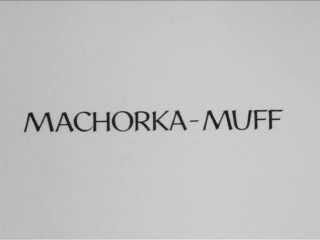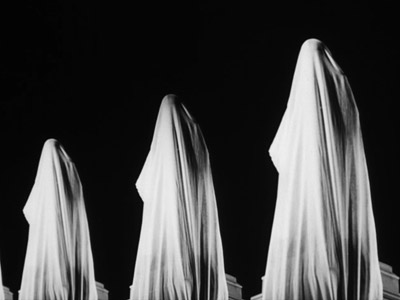 |
| From https://66.media.tumblr.com/74eb93ec8ddcd123be6593d 1ecff29c8/tumblr_pqmqfqlU7O1w7unbto1_400.png |
Directors: Jean-Marie Straub and Danièle Huillet
Screenwriter: Jean-Marie Straub
and Danièle Huillet
Based on Bonn Diary by Heinrich Böll
Cast: Erich Kuby as Oberst Erich von
Machorka-Muff; Renate Lang as Inniga von Zaster-Pehnunz
Obscurities, Oddities and One-Offs
 Straub-Huillet, Jean-Marie
Straub and Danièle Huillet, are a
duo that evokes weight. They are heavy weights of European art cinema but, in
the many discrepancies where prolific names weren't available to us plebeians,
are not as well known in English language cinematic culture in comparison to
their reputation. Thankfully, knock on wood, the current restorations of their
catalogue and widening availability (even physical releases in the USA by Grasshopper Film) will rectify this. Interestingly
the first work they ever put together was a short named Machorka-Muff, a very straightforward fragment of narrative stepped
in a thick morass of satire. This was far from the image of
"difficult" filmmaking as has been presented, and eventually appears,
in this duo's work.
Straub-Huillet, Jean-Marie
Straub and Danièle Huillet, are a
duo that evokes weight. They are heavy weights of European art cinema but, in
the many discrepancies where prolific names weren't available to us plebeians,
are not as well known in English language cinematic culture in comparison to
their reputation. Thankfully, knock on wood, the current restorations of their
catalogue and widening availability (even physical releases in the USA by Grasshopper Film) will rectify this. Interestingly
the first work they ever put together was a short named Machorka-Muff, a very straightforward fragment of narrative stepped
in a thick morass of satire. This was far from the image of
"difficult" filmmaking as has been presented, and eventually appears,
in this duo's work.
Machorka-Muff the character (Erich
Kuby) is a former colonel for the Nazi army who is to preside over an
opening ceremony for a new institute, as much to salvage the reputation of
another high ranking Fascist soldier of yore. He plans to marry Inniga von
Zaster-Pehnunz (Renate Lang), in
spite of her previous seven marriages and she being a Protestant to his
Catholic, with interest in having an adulterous relationship with another's
wife since he does enjoy "petty bourgeois eroticism". (Actually, in
muted tone, a hilarious line the many times I've watched this eighteen minute
short this year; again not expected from Straub-Huillet
in the damnedest to be writing actual jokes in their scripts).
He gets the girl, gets to preside
over the ceremony and political powers coinciding with public opinion may push
for more pro-militarisation, the fragment of a world here, based on a short
story by Heinrich Böll, entirely to
his favor. And yes, made in 1963, this is only two decades after the defeat of
the Fascists and World War II, and is made in West Germany, so this is all
disturbing. Hell, this feels disturbing and close to the bone in the 2010s even
if you the reader have more conservative politics to me the writer, as it feels
the coolest of satires as Machorka-Muff gets all he wants without his past with
the Nazis flashing consciousness of guilt.
 |
| From https://www.jonathanrosenbaum.net/wp-content/ uploads/2012/10/machorka-muff3.jpg |
Straub, in a written title card, calls this an abstract visual dream, but not abstract in what my view of avant-garde/weird cinema is, played as a narrative clear, calmly (but very well made) short film. It feels however, just into the 1960s, modern for the time, not needing to hammer its concerns home as it itself as a subject should alarm. This also shows their tendencies, within an accessible context, of the directors' trademark of very precisely put together films, cut and constructed so there's no fat to this particularly story; this is something to bear in mind as, with the same author, they also made Not Reconciled (1965), a story told in only fifty three minutes which weaves multiple time frames and situations into one of the densest films possible. Almost deadpan, Machorka-Muff has lines which should elicit perverse amusement as well as disbelief, such as comparing his seven war wounds to Inniga's former seven husbands. How banal all is, even her threat in the last dialogue, that her family's influence can alter politics, just a casual remark pouring tea, is a dark and more honest swipe at far-right wing politics, also itself satire as even these worse case scenarios of the upper class in power are utterly bland individuals if you stop and stare at them like here as zoo exhibitions.
It's not a surprise, when even
after World War II former Nazis were said to just be able to go into German
politics or the economy without fuss, that Straub-Huillet would make
this short as a warning. I suspect all the newspapers they cut to in montage
are all real, arguing for remilitarisation of Germany, even Christians arguing
that violence can be necessary in opinion pieces, despite a) there being a
clear cut difference between just war for soldiers to protect and rampant
violent militarisation, and b) no sane Christian should argue for violence over
benevolence, and c) this is just over twenty years from when Adolf Hitler was in power.
It's a nice, sudden and sly short
to being from; Straub-Huillet, even Straub himself when his life partner
passed, have a daunting and large filmography, going from ancient Greek texts
to documentaries, a non nonsense almost-documentary view on the legendary
composer Bach (originally their intended debut before falling onto Machorka-Muff) to even adapting Franz Kafka. It is nice to know though,
like all interesting auteurs, that if they only had a short length of film,
they could make something still compelling, and that they weren't averse to
accessible cinema as long as it stuck in the craw of the viewer.
 |
| From https://assets.mubi.com/images/notebook/post_ images/28029/images-w1400.JPG?1556114804 |
No comments:
Post a Comment